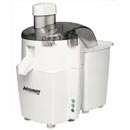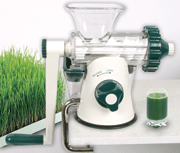Centrifugal Juicers Versus Masticating Juicers
When it comes to juicing, there are basically two types of juice machines that are available for you to choose from.
You can choose from centrifugal juice machines or masticating juicers.
Centrifugal Juicers
 Centrifugal means moving or directed away from a center or axis.
Centrifugal means moving or directed away from a center or axis.
A centrifugal juicer is the most common type of juicer you see in stores and on TV. A centrifugal juicer spins at high speeds and during the spinning motion, the vegetables that you have shoved down the chute are ground to a pulp. The spinning motion then forces the juice away from the pulp. The juice then pours into a bowl.
Masticating Juicers
 Masticating means to chew, to grind or knead into a pulp.
Masticating means to chew, to grind or knead into a pulp.
Your teeth are an excellent example of mastication in action. Your teeth chew and grind food. After you swallow, the food then goes to your digestive system which, through the process of digestion, begins to extract the juice from the food you eat.
Much in the same way, a masticating juicer grinds vegetables and literally squishes out the juice. Since a masticating juicer works at low speeds and with no spinning action, it tends to juice many vegetables more efficiently.






No comments:
Post a Comment